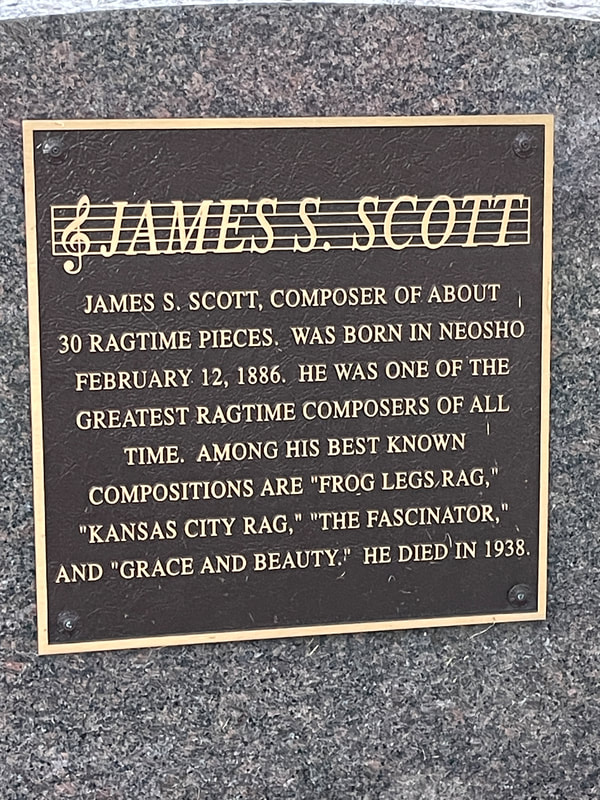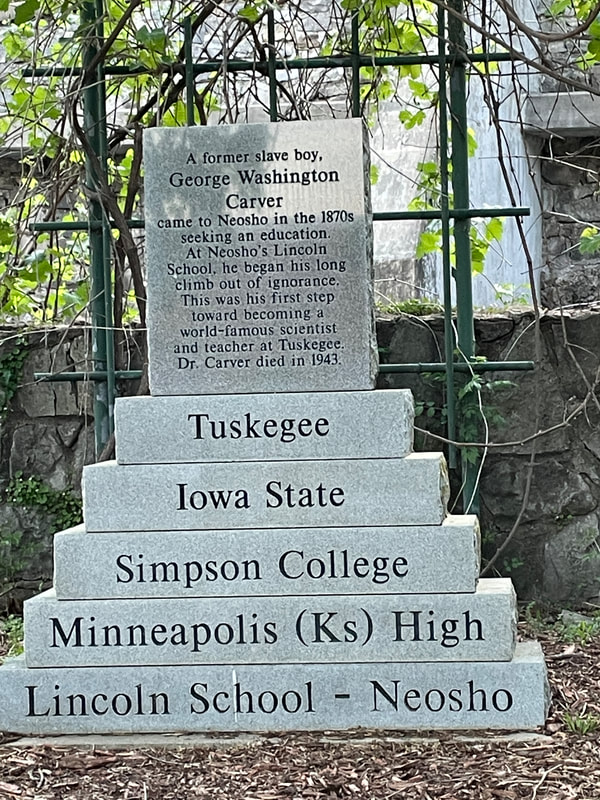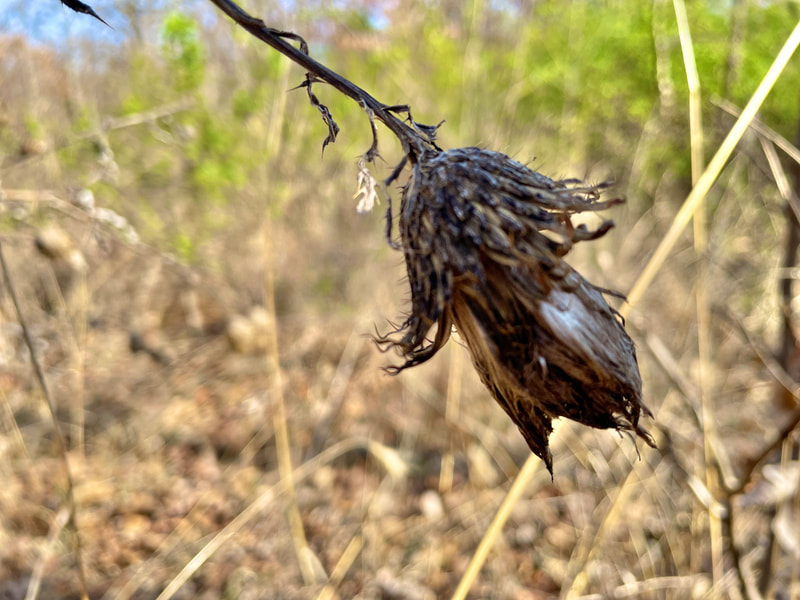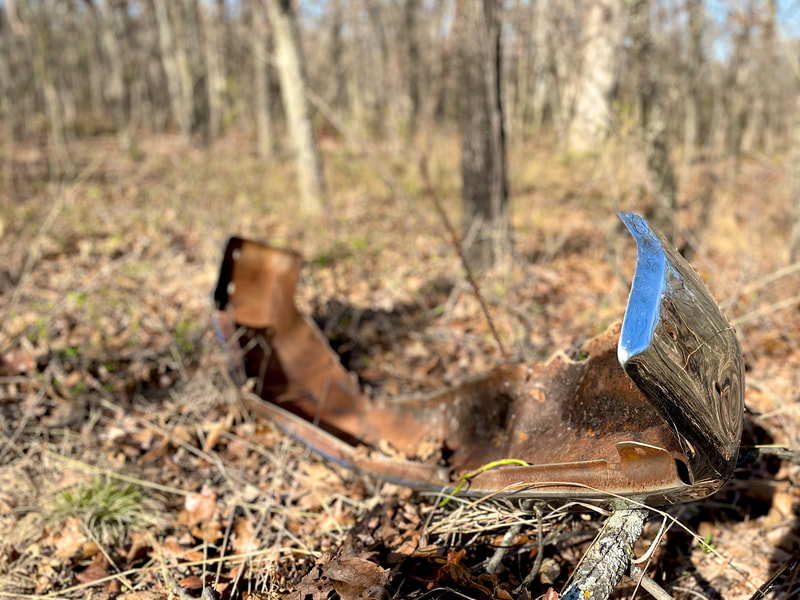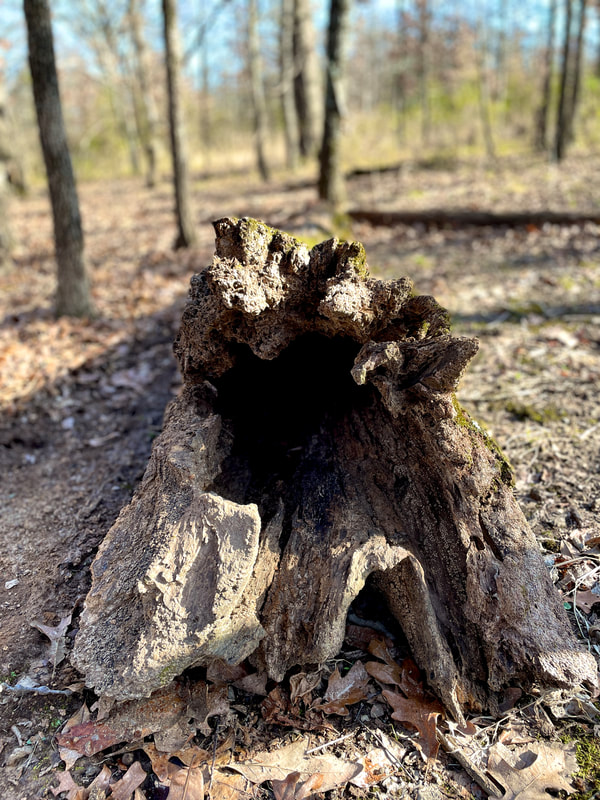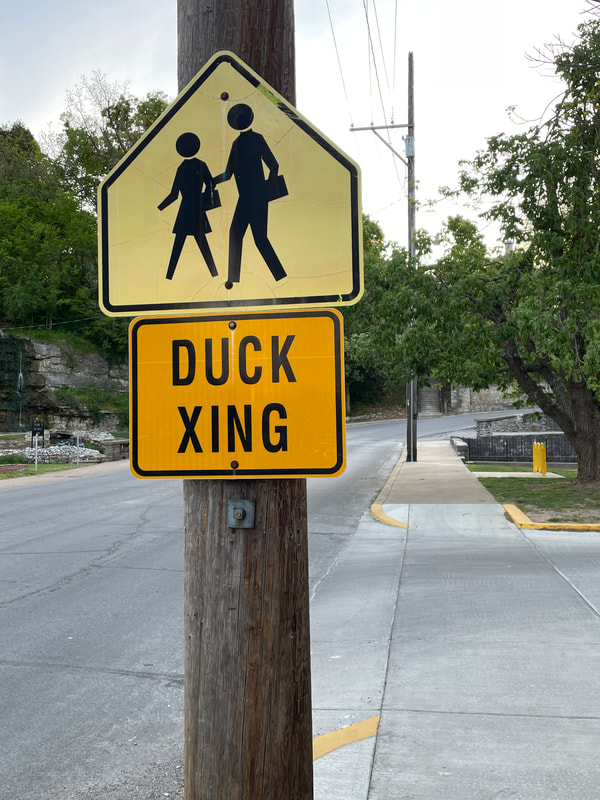| I was pleased to see some of this year's high school graduates as they paraded through the halls of Cecil Floyd Elementary on last time before crossing the stage to get their diplomas. These two plan to attend Pittsburg State University in the fall, which also made me happy - since I was also wearing a PSU shirt. To all Hoggatteers who graduated this year, congratulations and best wishes. Here's to a bright future in the "real" world - made even brighter now that you're in it. Once a Hoggatteer, always a Hoggatteer! |
|
0 Comments
“A river becomes crooked by following
the line of least resistance! So does man!” (unknown) I don't think I got pictures of all of the monuments to famous residents who called Neosho home, but here are four of them.
“The crime in life is the failure to have a lofty goal rather than the failure to reach it.”
(Leroy Brownlow)  Have you ever felt like you were alone, even in a stadium of thousands. Did you ever go on vacation where you were surrounded by hundreds or thousands of people who had no idea who you were? I know I have. I’ve been in places where I knew the answers to questions, where I had been trained better than the presenter, where I had credentials that qualified me for a certain honor but someone else was receiving it instead. How must one feel in those situations? I don’t know if that’s how these three men feel or not. We know them as James the Less, Simon the Zealot, and Judas (not Iscariot). How do you think they feel in Mark 10:35-41, for example? You’ll remember that section of Scripture as the time when two of Jesus’ apostles - John and the other James - approach Jesus to ask Him if they can sit next to Him in Heaven. Verse 38 has Jesus telling them, “You do not know what you are asking. Are you able to drink the cup that I drink, or to be baptized with the baptism with which I am baptized?” The two believe they can handle those things, but Jesus then says (verse 39), “The cup that I drink you shall drink; and you shall be baptized with the baptism with which I am baptized. But to sit on My right or on My left is not Mine to give; but it is for those for whom it has been prepared.” Then listen to verse 41: “Hearing this, the other ten began to feel indignant with James and John.” Three of those 10 are the three apostles in this lesson. We wonder if these others believe they should sit to the right and left of Jesus in Heaven, but we may realize differently when we think a little more about them. We’re taught to go for the gold, reach for the stars, be all you can be, look out for numero uno, etc. We’re taught that if you aren’t the lead dog the view never changes. But as hard as it might be to believe it, not everybody will get a trophy or get to celebrate his/her achievements. These three men seem to fit that bill. Metaphorically, they are always the bridesmaids and never the bride. We look at James, Simon, and Judas and we see three plain, ordinary guys - obscure apostles who don’t seem to amount to much - yet they remain important among the direct students of and missionaries for Jesus Christ. And while they may seem silent and obscure to us because of the Bible’s silence about them, God knows who they are. They are there with the others, feeding the hungry, giving drink to the thirsty, welcoming strangers, clothing the naked, visiting the sick and imprisoned (as described by Jesus in Matthew 25:31-40). James There are, of course, two apostles named James. There is James the brother of John who is among the closest of Jesus’ students, but there is another known as James the Less. As we look for him in the Gospel accounts, we find only his name. He is James the Less or James the Younger. There he is in Mark 15:40: “Now there were also some women watching from a distance, among whom were Mary Magdalene, Mary the mother of James the Less and Joses, and Salome.” We know him from Matthew 10:3 as the son of Alphaeus. Interestingly, Matthew is also referred to as the son of Alphaeus. Could they be brothers? There is really nothing to say that they are brothers. Peter and Andrew are brothers. John and the other James are brothers. But the Bible never says that Matthew and James the Less are brothers. It’s possible but unlikely. They don’t even show up in any of the lists together. So we only know what we know - that he is James the Less. Less what? Less important than the other James? Was he smaller than the other James? By saying that he is “the less”, it’s possible that we mean that he is smaller or younger. Some believe that this James was probably small in size, younger, and even quieter. Maybe that’s why he remains in the background. The silence of Scripture means that we don’t have any record of him writing any books (unless he is that brother of Jesus). We don’t hear him asking Jesus any questions. We don’t see Jesus ever scolding him. But he is there, one of the 11 faithful apostles. Simon Simon is the same way. This isn’t Simon Peter, but a different Simon, and about the only thing we know about him is his name, along with the tag at the end of his name - Zealot. Now it could be that he is just really full of zeal - that he’s on fire for the mission at hand, but it seems there is more to the title. Generally, we consider Simon to be a member of a notorious group of renegade vigilantes known as the Zealots. They are an extremist group that hates the Romans. They are dedicated to eradicating the occupying force, and they will do anything to achieve that goal. They have a propensity to be violent, always concealing knives under their clothing and always ready to act out in vengeance. They plot and scheme to assassinate Roman leaders and anybody else they consider to be an enemy of Israel. How do you think that sits with Matthew? Matthew had previously sold out to the Romans, and even though he is Jewish, Matthew signed up to collect taxes for Rome, and perhaps he even profited by overcharging the Jews in the process. At one time, Simon might have happily murdered Matthew, and likewise, Matthew might have quickly reported Simon to the authorities. Yet, we see them in our mind’s eye as sitting at the same table, standing elbow-to-elbow with Jesus and the other apostles with a common message and a common mission. By their mutual association with the Christ, these two unlikely friends are uprooted from their pasts and united in brotherhood. That’s a mighty message of the transformative effect that Jesus has - and it’s one we must not miss in our relationships in the church today. Judas (not Iscariot) There are two Jameses. There is another Simon. And the third apostle in this lesson shares that: there is another Judas in the group. This Judas shares a name with the traitor in the group, and he is identified as Judas (not Iscariot). I wonder if he spends the rest of his life introducing himself that way: Hello. It’s nice to meet you. My name is Judas. No not that Judas. I am Judas (not Iscariot). It would be akin to somebody with the unfortunate name of Adolf or the surname of Hussein. John 14:22 is where we see this: “Judas (not Iscariot) said to [Jesus], ‘Lord, what has happened that You are going to reveal Yourself to us and not to the world?’” This is the only location outside of the lists of apostles that we read about him. But you can look at the remarkable answer from Jesus. When Judas (not Iscariot) asks about Jesus revealing Himself to “us and not to the world”, Jesus gives a lengthy answer. Read John 14:22-31, “If anyone loves Me, he will follow My word; and My Father will love him, and We will come to him and make Our dwelling with him. The one who does not love Me does not follow My words; and the word which you hear is not Mine, but the Father’s who sent Me.” Those are very important statements as to where our authority comes from. Then, again because this Judas, or Thaddaeus as he appears in Matthew 10:3, asks the question about Jesus revealing Himself, Jesus continues to explain (verse 25): “These things I have spoken to you while remaining with you. But the Helper, the Holy Spirit whom the Father will send in My name, He will teach you all things, and remind you of all that I said to you.” Verse 27: “Peace I leave you, My peace I give you; not as the world gives, do I give to you. Do not let your hearts be troubled, nor fearful.” Verse 28: “You [still responding to Judas] heard that I said to you, ‘I am going away, and I am coming to you.’ If you loved Me, you would have rejoiced because I am going to the Father, for the Father is greater than I. And now I have told you before it happens, so that when it happens, you may believe. I will not speak much more with you, for the ruler of the world is coming, and he has nothing in regard to Me, but so that the world may know that I love the Father, I do exactly as the Father commanded Me. Get up, let’s go from here.” Conclusion Being a servant of God is not about us. It’s about sharing Jesus with others through our lives. It is about being selfless and allowing God’s light to shine through us. It’s God’s light, not our own, that has the power to transform. John 6:66 says that there are some who leave the Lord because His teachings may be difficult, but James, Simon, and Judas (or Thaddaeus) remain with him. They are counted among the other faithful apostles at Pentecost in Acts 2. James, Simon, and Judas don’t vie for the limelight. They don’t try to climb the ladder to a higher-paying position within the company. What we know about them is that they effectively ro about the business of fulfilling the great commission, bringing people to Jesus and baptizing them for the forgiveness of their sins. Any or all of these three could be brothers of Jesus, born of Mary, but there is no way we could know for certain. Again, that’s why we can only speculate about how they die - and even then, we have to rely on traditions and legends. James the less could have shared the Gospel in Egypt. Simon the Zealot may have traveled to the British Isles after the fall of Jerusalem. Judas (not Iscariot) might have taken the teachings to Turkey. And because we don’t know if they are the same as others with their namesakes, we can only guess at their forms of death. I discovered that I started to share this a while ago, before the trees were leaved. I finally explored the woods behind our house with my son, and these were some of the things we found. It does make you wonder about how some of those things came to be in this wilderness location. This is a forest of trees and brush and yet pollution finds its way in. I suspect there used to be a "farm" road of sorts through here. There's just no other reasonable explanation for how a vehicle bumper could be here; who would carry it in? The brush and undergrowth have now risen to levels that make it a little more inaccessible, but I'm thankful to be blessed with living among the beauty that nature offers and not to be penned in by urbanity or even suburbia.
“There is a crack in everything
That’s how the light gets in.” (Leonard Cohen) Big Spring Park in Neosho is an oasis that sits just off the square in the Newton County capitol. In my short walk-through, earlier this month, I discovered it to already be in bloom in some landscaped spots but not yet sprouted in others. The history of Rocketdyne is here, as well as some other things to enjoy. I'll have more to come regarding some of the famous Neosho residents of the past.
"Failure is the condiment
that gives success its flavor." (Truman Capote)  Even if these two apostles - Matthew and Thomas - are not as prominent as some of the other apostles, we seem to know them better than some of the others. I don’t know that we compare or contrast our lives and our personal characteristics with Matthew and Thomas as much as we do a Peter or a John, but there are some aspects that we can look at that may inspire us to do so. Matthew First, we have Matthew. Scripture is pretty direct concerning Matthew. Mark 2:14 says, simply, “As He passed by, He saw Levi the son of Alphaeus sitting in the tax office, and He said to him, ‘Follow Me!’ And he got up and followed Him.” Levi, the footnote says, is another name for Matthew, the universally-accepted author of the book of Matthew. Every Gospel account records the calling of Matthew. There is no previous interaction between him and Jesus, so it sounds a little ridiculous to our ears. A stranger walks up and says, Follow me, and this Jewish tax collector for Rome suddenly and seemingly blindly quits his job to follow the stranger. There is more recorded about the Samaritan woman at the well, when Jesus talks to her about the Living Water and she drops her waterpot to follow Him. But is it possible that Matthew has already heard of Jesus? Could he have been exposed to the teaching of Jesus before this interaction? There is, of course, more to Matthew’s acceptance of Jesus. Like the woman at the well, it seems that Matthew immediately wants to share Jesus with his peers. He puts together a dinner and invites others, including some fellow tax collectors, to come and meet Jesus. The religious leaders who are lurking around every corner trying to catch and police Jesus can’t stand it: they just can’t accept that now He is associating with vile and dishonest tax collectors. They might be afraid that a partnership with Rome could be established and that Jesus will bring the power of tax collection and the Roman government down on their own authority. Then there is Jesus’s response in Luke 5:31f: “It is not those who are healthy who need a physician, but those who are sick. I have not come to call the righteous to repentance, but sinners.” Is Matthew guilty by association? There isn’t any indication that he was dishonest in his position, but we also know how despised the tax collectors were (and perhaps still are). Matthew would have been considered a traitor to the Jews. He is an easy target for the Jews in Capernaum to hate. In fact, tax collectors like Matthew often found themselves in the same lists with prostitutes and low-level social outcasts. Nobody ever said that Jesus went out to find the popular citizens. He might have had an easier time of it if He had gone to the celebrities and the politicians, the powerful and the rich. Matthew might have provided some commentary to people as they listened to all of the references that Jesus made to tax collectors. They heard the Parable of the Pharisee and the Tax Collector in Luke 18:10-14, for example, where Jesus contrasts the two characters - a Pharisee bragging about himself and looking down on the other man and the other man, the tax collector, standing in the corner, penitent, not even able to show his face before God. David Laton said, “I suspect Matthew hung on every word, fully understanding the emotion of the tax collector in the parable.” Like Zacchaeus, a chief tax collector that Jesus encounters, it is not Matthew’s position that attracts the Savior’s attention. It’s not his rejection or his acceptance in the village that catches the eye of Christ. But it might be their sheer willingness to leave their wealth and follow. Matthew records for us the Sermon on the Mount (in Matthew 5-7), in which Jesus helps us understand some direct and simple applications of God’s expectations of us. Matthew outlines those extremely difficult words in Matthew 10:37-39: “The one who loves father or mother more than Me is not worthy of Me; and the one who loves son or daughter more than Me is not worthy of Me. And the one who does not take his cross and follow after Me is not worthy of Me. The one who has found his life will lose it, and the one who has lost his life on My account will find it.” He also gives us the answer to the big question in Matthew 22. When one of the religious leaders asks Jesus for the greatest commandment in the Law, Jesus answers (as recorded in Matthew 22:36-40, “‘You shall love the Lord your God with all your heart, and with all your soul, and with all your mind.’ This is the great and foremost commandment.” Then He goes on to provide the second greatest, “You shall love your neighbor as yourself,” adding “Upon these two commandments hang the whole Law and the Prophets.” The Great Commission shows up in Matthew’s writing, in Matthew 28:18-20, when Jesus tells His apostles, “All authority in heaven and on earth has been given to Me. Go, therefore, and make disciples of all the nations, baptizing them in the name of the Father and the Son and the Holy Spirit, teaching them to follow all that I commanded you; and behold, I am with you always, to the end of the age.” Imagine how despised Matthew is when Jesus finds him. Contrast that with the love he receives from Jesus. Thomas In Thomas, we notice other personal characteristics that we might not want to share. As we’ve studied in the past, he is not the only one to doubt, but that seems to be his legacy and all that some know about him. We don’t read very much about Thomas outside of his being listed with the other 11 apostles in the Gospels and in Acts. We don’t know about his trade. We don’t know about his education. We don’t know if he belongs to the Lions Club, the Kiwanas, a union, or the chamber of commerce. In John 11:16, he is referred to as Didymus, which means twin. The first time we hear Thomas speak is there in that verse. Lazarus has died, and Jesus wants to go back to Bethany to visit the tomb and Lazarus’ family, but Thomas discourages Him, saying, “Let’s also go, so that we may die with Him!” I imagine this is kind of like saying, “Oh yeah, right! That’s a great idea, Jesus. Let’s all go back over there so we can all die with Lazarus!” We are so glad that Thomas asks Jesus that all-important question in John 15:5f, “Lord, we do not know where You are going; how do we know the way?” to which Jesus answers him, “I am the way, and the truth, and the life; no one comes to the Father except through Me.” And of course there is the occasion on which Thomas gains his nickname. After the resurrection of Jesus, with all of the remaining apostles together, except Thomas. Where is Thomas, by the way? It must be Providence that keeps him out of the loop for this return appearance by Christ, because we are provided the great example of his faith in John 20:24-29. When he finally shows up, the others can’t wait to tell him they’ve seen the risen Savior, and there’s where Thomas says he won’t ever believe such a thing: he says, “Unless I see in His hands the imprint of the nails, and put my finger into the place of the nails, and put my hand into His side, I will not believe.” When he is finally in the same room with Jesus, Jesus offers His hands and His side for Thomas to tactically feel the wounds, but Thomas immediately defers to the Christ. He says, simply but with tremendous and submissive belief, “My Lord and my God!” Jesus then says, “Because you have seen Me, have you now believed? Blessed are they who did not see, and yet believed.” We all have those moments when we question our faith. Some of us at times have doubts that Jesus would or could possibly be who He claims to be. Many doubt that Jesus would ever forgive them. But Jesus always stands prepared to forgive anyone who repents and turns to Him. We see that with Thomas. Tradition says that both of these leaders died as martyrs. Thomas most likely died in India, where he was stabbed with a spear. As for Matthew, there are conflicting reports, some saying he was burned, others claiming he was stoned, or stabbed, or beheaded with a halberd. Conclusion With each of these, we figure out that no matter our backgrounds, Jesus wants us to follow Him. We see in the book penned by Matthew, a great invitation. It rests comfortably in Matthew 11:28-30, and it is an invitation that we continue to offer to the world in the name of Jesus. A familiar passage, it says, “Come to Me, all who are weary and burdened, and I will give you rest. Take My yoke upon you and learn from Me, for I am gentle and humble in heart, and you will find rest for your souls. For My yoke is comfortable, and My burden is light.” "An arrow can only be shot by pulling it backward. When life is dragging you back with difficulties,
it means it's going to launch you into something great. So just focus, and keep aiming." (unknown) "If your uniform isn't dirty,
you haven't been in the game." (Ben Bernanke)
I saw this one in my rear view mirror, at first thinking it was a fire that produced a smoke that blended really well with the cloud...but when the "smoke" stopped, the cloud never dissipated, and when the "smoke" reformed, I knew it for what it was - an actual tornado. It was a few minutes before the storm sirens were finally activated. I waited out the storm before returning home, realizing that this thing might have done some damage in our own neighborhood (It's hard to determine how far away these things are just by sight.). Sure enough, there were some trees down, some on houses and some on cars. It appeared that most of the damage was done to vehicles crushed under the weight of trees (since we live in a forest). After walking around and talking to neighbors, I could see that at least one house was also badly damaged when a fully-developed oak fell in such a way as to slice it in half. As for our own house, it still sits about a block away from tree damage to the east and roof damage to the south. We were not even among the thousands who lost power. The only result of the storm for us was an added twig that landed on the garage, easily swept away in the next rainstorm.
"Kites rise against the wind, not with it."
(Winston Churchill) |
AnthemThe Hoggatteer Revolution
is an extensive, award-winning, inimitable, digital platform for Encouraging and Developing the Arts, Sciences, and honest Christianity in the beautiful, friendly LAND OF THE FREE AND THE HOME OF THE BRAVE This site is described as
"a fantastic site... chockablock full of interesting ideas, hilarious anecdotes, and useful resources." 
...to like, bookmark, pin,
tweet, and share about the site... and check in regularly for new material, posted often before DAWN'S EARLY LIGHT! History in ResidenceElementary Schools: Bring Mr. Hoggatt into your classroom for a week of engaging and rigorous history programming with your students. LEARN MORE BUILDING BETTER
|



